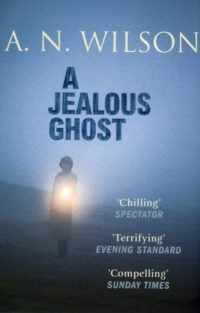Had he said that? Or had she just made him say it inside her head?
 A Jealous Ghost
A Jealous Ghost
by A N Wilson
Way way back at primary school, I think for my 10th birthday, a boy in my class gave me the book Stray by A N Wilson. I hadn’t heard of the author and I wasn’t especially close friends with the boy, but it was a really well chosen gift. I loved that book (it’s about a stray cat and it’s sad and lovely and I’m pretty sure I still have it). But for some reason I never looked out for other books by the same author.
Then two years ago, Tim’s mum was clearing out some books and offered me my pick of them first. I couldn’t quite figure out why the author’s name was familiar when I picked this up but the story appealed to me, and then later I realised and was glad I was finally going back to Wilson.
The story is that of Sallie, an American student in London writing her PhD on Henry James’ The Turn of the Screw. She’s struggling to make friends, struggling to come up with a thesis argument that her PhD supervisor is happy with, struggling to pay rent. So someone suggests she takes time out with a summer job – perhaps as a live-in nanny so she doesn’t even have to pay rent. When at her job interview she learns that she will be looking after two young children in a country house with neither parent around – just like in The Turn of the Screw – it seems like fate.
“She had sensed immediately that it was hurt which kept him away from Staverton. ‘I’m busy – ridiculously busy, as it happens,’ he had said. ‘And the big cases always seem to crop up when I’d rather be with the children.’
When he had said that, she had felt him, as it were, reaching out for her, needing her.
‘Staverton’s a place, as you can guess, which has its unhappy associations.’
Had he said that? Or had she just made him say it in the rerun of the conversation that had been playing inside her head since she came down in the glass elevator and skipped out on to the sidewalk?
‘Let me lay my cards on the table and be absolutely frank with you, Sallie.’
Those words he had quite definitely said.”
On arrival at the house it gets even weirder. The children, Frances and Michael, are the same ages as Flora and Miles in The Turn of the Screw. There’s a housekeeper, Gloria, and a gardener, just like in the book. And Sallie is convinced that she can sense the jealous ghost of the children’s dead mother. She hopes to use all this to get a new angle on Henry James and spends as much time as she can trying out arguments rather than taking care of the children.
It’s clear fairly early on that not only is Sallie an intellectual snob stuck in her ivory tower but she’s also wholly unsuited for the job of looking after children. She has no idea what to do with them, doesn’t obey their father’s rules and hides whenever she can. It also becomes clear that she is unreliable, both as a nanny and as a main character (she doesn’t narrate the story, but it’s very much told from her perspective). She lies. She behaves oddly. As early as the job interview she convinces herself that the children’s father Charles is interested in marrying her. She frequently refers to Frances as Flora.
“To Sallie’s eyes [the neighbour’s toddler] was appalling, repellent. His walk was like that of a very drunken man, strutting about the place, not caring what he wrecked, yet arrogantly suggestive that he owned the place…It was evident that Lucy worshipped him. Sallie wondered at the power of maternal love. The logical reaction to this selfish little presence in the room, which was drawing all attention to itself and interrupting any interesting conversation, would have been to kick it.”
It’s all very intriguing and casts a fascinating new light on The Turn of the Screw, which I read in my first year at uni. However, in the first half of this book I almost felt that I was reading a literary analysis of Henry James thinly veiled as a novel. And Sallie is an extremely irritating person to begin with, appearing to put no real effort into engaging with the world around her. The second half of the book is much better, and actually quite exciting.
I think I would have enjoyed this much more 10, 15 years ago, but not necessarily because it would mean I’d read The Turn of the Screw more recently. I don’t know that you need to have read it at all, as this book pretty thoroughly explains it to you. But you might get more from it if you know the Henry James source material. I actually mean I would have liked it more when I was younger because my choice of reading tended more to the intellectual. I wouldn’t have been so irritated by Sallie. I might even have sympathised with her, having au paired myself when I was 18 and felt at times that I was floundering in a remote part of a foreign country without any easy way to get away for a few hours or confirm whether I was doing okay.
But Sallie isn’t 18. She speaks the same language as everyone around her and as it’s 2005 she probably has access to the Internet. The country house makes it feel very out of time, but the occasional mention of mobile phones and DVDs makes it clear that this is modern. She is deluded and confused and creepy. Which is what you want in a good ghost story after all.
Published 2005 by Hutchinson.
Source: Tim’s mum.